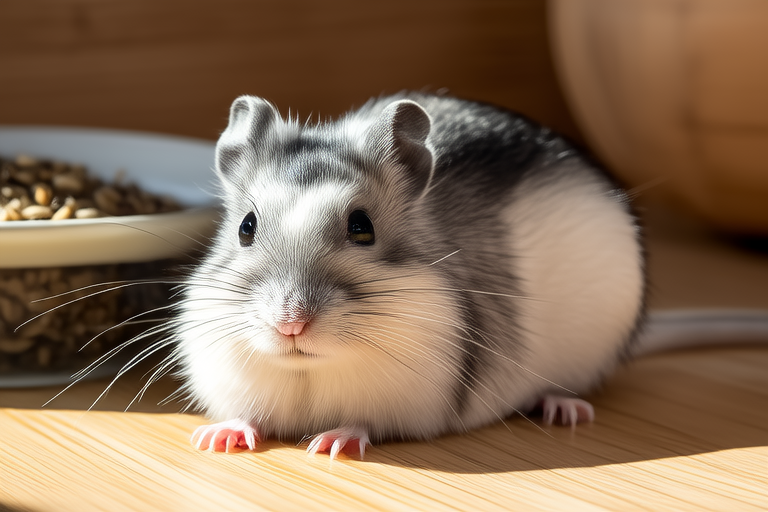Chinchilla Care Made Simple: Tips for First-Time Owners
Welcome to the world of chinchillas! These adorable, fluffy rodents are known for their luxurious fur and playful nature. As a first-time owner, you may feel overwhelmed by the responsibility of caring for such a unique pet. This guide aims to simplify the process, offering practical advice to help your chinchilla thrive.
Habitat Setup
The first step in chinchilla care is creating a safe and comfortable living space. Chinchillas require a cage that is large enough for them to move around freely. The minimum recommended size for a single chinchilla is 36 inches wide, 24 inches deep, and 24 inches high. For two chinchillas, the cage should be at least twice this size.
- Bedding: Use paper-based bedding or aspen shavings. Avoid cedar and pine, as they can cause respiratory problems.
- Toys: Provide chew toys to keep your chinchilla’s teeth healthy. Opt for wooden or cardboard toys specifically designed for small animals.
- Exercise: Chinchillas need opportunities to jump and climb. Install ramps, shelves, and ladders within the cage to encourage physical activity.
- Privacy: Include a hideaway or a small box where your chinchilla can retreat for solitude.
- Cleaning: Regularly clean the cage to prevent the buildup of urine and feces, which can lead to health issues.
Ensure the cage is placed in a quiet area away from direct sunlight, drafts, and excessive noise. Chinchillas are sensitive creatures and thrive in a calm, secure environment.
Dietary Needs
Proper nutrition is crucial for your chinchilla’s health. Their diet should primarily consist of high-quality chinchilla pellets. Supplement with timothy hay, which aids digestion and keeps their teeth healthy. Fresh water must always be available, preferably in a sipper bottle.
- Fruits and Vegetables: While it’s tempting to offer treats like fruits and vegetables, these should be given sparingly. A small piece of apple or carrot once a week is sufficient.
- Avoid: Never feed chocolate, caffeine, citrus fruits, or any food high in sugar or fat. These can be harmful to your chinchilla.
Monitor your chinchilla’s weight and adjust feeding amounts accordingly. Overfeeding can lead to obesity, while underfeeding can result in malnutrition.
Grooming Requirements
Chinchillas have dense, soft fur that requires special care. They naturally clean themselves through dust baths. Set up a shallow container filled with commercial chinchilla dust. Allow your chinchilla to bathe for about 15 minutes daily. Excessive bathing can dry out their skin, so limit it to one session per day.
- Brushing: Occasionally brush your chinchilla’s fur with a soft-bristled brush to remove loose hairs and prevent matting.
- Nail Trimming: Keep your chinchilla’s nails trimmed to prevent overgrowth, which can make walking difficult. Consult a veterinarian if unsure how to do this safely.
- Ear Cleaning: Clean the inside of the ears gently with a damp cotton ball if necessary.
Regular grooming not only maintains your chinchilla’s appearance but also strengthens the bond between you and your pet.
Common Health Issues
Despite their hardiness, chinchillas can suffer from various health problems. Early detection and intervention are key to maintaining their well-being.
- Overgrown Teeth: Chinchillas’ teeth grow continuously. Signs include drooling, difficulty eating, or weight loss. Regular chewing on appropriate toys helps keep teeth at a manageable length.
- Diarrhea: Diarrhea can indicate digestive issues. Monitor your chinchilla’s diet and consult a vet if symptoms persist.
- Bacterial Infections: Chinchillas are susceptible to infections, especially when stressed or living in unsanitary conditions. Maintain a clean cage and watch for signs of illness, such as lethargy or loss of appetite.
- Skin Conditions: Dry skin can occur due to insufficient bathing. Conversely, over-bathing can lead to skin irritation. Adjust the frequency of dust baths as needed.
Regular veterinary check-ups are vital for early detection and treatment of potential health issues.
Handling and Socialization
Chinchillas are delicate animals and should be handled with care. Approach your chinchilla slowly and gently, allowing them time to become accustomed to your presence.
- Picking Up: Support your chinchilla’s body with both hands, ensuring their feet are securely held. Never pick them up by the tail or ears.
- Taming: Spend time interacting with your chinchilla each day. Offer treats and speak softly to build trust.
- Playtime: Supervised play outside the cage is beneficial for mental stimulation. Ensure the room is safe and free from hazards.
Patience is key when socializing your chinchilla. With consistent effort, they will become more comfortable around you.
Creating a Quiet, Secure Environment
Chinchillas are highly sensitive to noise and sudden movements. To provide a peaceful home, minimize loud noises and avoid abrupt actions around your pet. A serene atmosphere helps reduce stress and promotes better health.
- Location: Place the cage in a quiet corner away from household activities.
- Background Noise: Soft music or white noise can help mask sudden sounds.
- Visual Security: Position the cage where your chinchilla can see but not be startled by passersby.
By understanding and addressing these needs, you create an environment where your chinchilla feels safe and happy.
Conclusion
Raising a chinchilla is a rewarding experience, but it comes with responsibilities. By setting up an appropriate habitat, providing a balanced diet, maintaining proper grooming, and addressing common health concerns, you ensure your chinchilla lives a long, healthy life. Remember, patience and consistency are essential when handling and socializing these sensitive pets. With love and care, you and your chinchilla will form a strong bond, making every moment together enjoyable and fulfilling.
